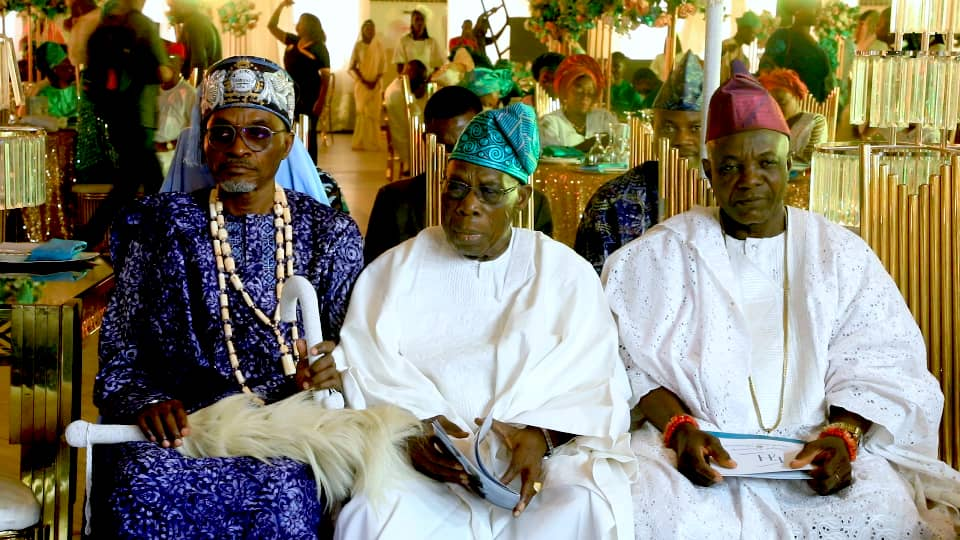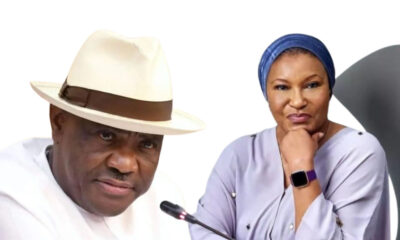Uncategorized
Will Trump’s obstinacy weaken US democracy?

- Pompeo: There’ll be smooth transition to second Trump administration
- Trump refusal to concede embarrassing – Biden
- Experts predict what will happen
Rasheed Bisiriyu
The world is watching the drama playing out in the United States after the presidential election last week with keen interest.
In the tensely contested poll between the incumbent, Donald Trump of the Republican Party and his challenger, Joe Biden of the Democratic Party, the later won the race with 77,170,769 popular votes (50.8%) and 290 Electoral College votes against Trump’s 72,057,511 votes (47.5%) and 214 electoral votes.
Trump has accused the Democrats of electoral fraud and headed to court to challenge the outcome of the election, insisting that he was victorious at the poll.
But the president-elect, Biden, called Trump’s actions since the election day “an embarrassment.”
Election officials across the country said there was no evidence that fraud or any other irregularity played a role in the outcome of the presidential race.
There appears no sign that Trump is ever going to accept the results of the poll even if he loses at the court.
Secretary of State Mike Pompeo said on Tuesday with a grin that there would be a “smooth transition to a second Trump administration,” echoing President Trump’s demands for a delay until “every legal vote” is counted.
President Trump, facing the prospect of leaving the White House in defeat in January, is using power of the federal government to resist the results of an election that he lost, something that no sitting president has done in American history.
In the latest sign of defiance on Tuesday, Secretary of State Mike Pompeo predicted “a smooth transition to a second Trump administration,” defending the president’s refusal to concede even as President-elect Joseph R. Biden Jr. called Mr. Trump’s actions since Election Day “an embarrassment.”
Secretary of State Mike Pompeo said on Tuesday with a grin that there would be a “smooth transition to a second Trump administration,” echoing President Trump’s demands for a delay until “every legal vote” is counted.
His words: “There will be a smooth transition to a second Trump administration. All right, we’re ready. The world is watching what’s taking place. We’re going to count all the votes. When the process is complete, they’ll be electors selected. There’s a process — the Constitution lays it out pretty clearly. The world should have every confidence that the transition necessary to make sure that the State Department is functional today, successful today and successful with the president who’s in office on Jan. 20, a minute after noon, will also be successful. I went through a transition on the front, and I’ve been on the other side of this. I’m very confident that we will do all the things that are necessary to make sure that the government, the United States government, will continue to perform its national security function as we go forward.”
Speaking to reporters in Delaware, Biden shrugged off Pompeo’s comments, saying that his transition was moving along well and that he was confident that Republicans would eventually accept his victory.
“They will; they will,” he said.
The president’s attorney general, William P. Barr, has also authorized investigations into supposed voter fraud, his general services administrator has refused to give Biden’s team access to transition offices and resources guaranteed under law, and the White House is preparing a budget for next year as if Trump will be there to present it.
Trump started the week by firing Defense Secretary Mark T. Esper and the heads of three other agencies while installing loyalists in key positions.
Allies expect more to come, including the possible dismissal of the directors of the FBI and the CIA.
The moves have left the United States in the position of the kind of country whose weak democratic processes the US often criticises.
Rather than congratulating Biden and inviting him to the White House, as his predecessors traditionally have done after an election changed party control, Trump has been marshaling his administration and pressuring his allies into acting as if the outcome were still uncertain.
The president’s efforts to discredit with false claims both the election results and the incoming Biden administration is in many ways the culmination of four years of stocking the government with pliant appointees while undermining the credibility of other institutions in American life, including intelligence agencies, law enforcement authorities, the news media, technology companies, the federal government more broadly and now election officials in states across multiple time zones.
The president is employing the powers of the government to resist election results.
Officials across the U.S. say they found no evidence that voter fraud played a role in the election results.
Secretary of State Frank LaRose of Ohio, standing, with his team in Columbus on election night. “There’s a great human capacity for inventing things that aren’t true about elections,” he said.
Election officials in dozens of states representing both political parties said that there was no evidence that fraud or other irregularities played a role in the outcome of the presidential race, amounting to a forceful rebuke of President Trump’s claims of a fraudulent election.
Steve Simon, a Democrat who is Minnesota’s secretary of state, said, “I don’t know of a single case where someone argued that a vote counted when it shouldn’t have or didn’t count when it should. There was no fraud.”
A spokeswoman for Scott Schwab, the Republican secretary of state in Kansas, said in an email on Tuesday. “We are very pleased with how the election has gone up to this point.”
But over the past several days, Trump, members of his administration, congressional Republicans and right-wing allies have falsely claimed that the election was stolen from Trump and refused to accept results that showed Biden as the winner.
According to a report by Joe Middleton in The Independent newspaper of the UK, peaceful transition of power is the bedrock of American society, and notes that even in past contentious elections, resolutions had been made long before any refusal to concede.
It recalled that Richard Nixon conceded to John F Kennedy in 1960 amid several accusations of vote rigging for the Democrat, for instance. Vice president Al Gore accepted the Supreme Court’s ruling that George Bush had won the 2000 presidential election even though there were significant questions about the integrity of the results in Florida.
This view is shared by a writer and editor Amy Mckeever in a national geographical.com report saying no modern presidential candidate has refused to concede.
“The formal concession speech has played a vital role in even the most divisive U.S. elections, from the Civil War to Bush v. Gore,” she states.
Middleton quotes a professor of political science at the University of British Columbia, Paul Quirk, as saying Trump refusing to concede could put law enforcement in an awkward position.
Quirk says, “At some point, the question would become: whose orders do law enforcement (agents) obey? Because it would ultimately become a matter of the use of force in one direction or another.”
The US constitution is said to have made no mention of how a president should be removed if they lose an election and refuse to hand over power to their opponent. So, it is hard to say if anyone would have the appetite to send the FBI, or navy seals, or whatever law enforcement agency, storming into the West Wing to arrest recently defeated Donald Trump.
Another professor of political science at the University of New Haven, Joshua Sandman, said he did not think Trump would ever refuse to leave office after an election because it would destroy the president’s legacy.
He insisted intense congressional and political pressure would force Trump out of office quickly.
“The first line of defence would be the congress, and his party pressuring him out, telling him he must resign or leave,” Sandman says, adding, “If he wants to stay in the White House, he would stay in the White House. But, again, hypothetically you don’t need that. The White House is symbolic. It’s not a seat of power, necessarily.”
In an interview with The Independent in 2019, Ross Baker, an American political expert at Rutgers University in New Jersey, made a prediction of what would happen if Trump lost re-election by a very narrow margin.
He imagined a scenario where the popular vote was won by less than one per cent nationwide, and where there was a near tie in the electoral college. On 4 November 2020, America could wake up to tweets from the president calling the previous day’s results a fraud, and saying there is no way he did not win by huge margins.
Should that happen, Baker said he imagined a scenario in which the House of Representatives got to decide the electoral college based upon each state’s delegation
“It would certainly be a constitutional crisis to the first magnitude,” Baker he said.
Mckeever, recalling how concessions became an election tradition, reports that peaceful transfer of power has been a norm since 1800, when the country’s second president John Adams became the first to lose his reelection bid and quietly left Washington, D.C., on an early morning stagecoach to avoid attending his successor Thomas Jefferson’s inauguration.
According to the report, some early presidential candidates did send congratulatory letters to their opponents, says John R. Vile, dean of political science at Middle Tennessee State University in Murfreesboro, who has written about the history of concession speeches. But formal concessions didn’t become an election custom until 1896, when Republican William McKinley defeated Democrat William Jennings Bryan.
In his account of the campaign in a later memoir, Bryan wrote that he began to resign himself to the loss by 11 p.m. on election night—a resignation that grew in the subsequent days as states completed counting ballots. On Thursday evening, Bryan learned that his loss was certain and immediately sent a telegram to McKinley, offering his congratulations and stating: “We have submitted the issue to the American people and their will is law.”
With that, a custom was born—much to Bryan’s own bewilderment as he considered it to be simply the courteous thing to do. “This exchange of messages was much commented upon at the time, though why it should be considered extraordinary I do not know,” Bryan wrote. “We were not fighting each other, but stood as the representatives of different political ideas, between which the people were to choose.”
Ever since, losing candidates have conceded to their opponents—even sitting presidents. In 1912, for example, Republican President William Howard Taft conceded to Democrat Woodrow Wilson at 11 p.m. on election night, while in 1932 Republican incumbent Herbert Hoover telegraphed his congratulations to Democrat Franklin Delano Roosevelt the day after the New York governor unseated him, and Hoover promised to dedicate himself “to every possible helpful effort.” (In the wake of the election, however, Hoover became a vocal critic of FDR’s policies.)
In 1960, Republican Vice President Nixon sealed his own loss to Democrat John F. Kennedy when, in his role as president of the Senate, he counted and confirmed the electoral votes. Even though Hawaii had sent two sets of votes after its results had been briefly contested, Nixon asked for, and received, unanimous consent to count the state for his opponent since they would not have changed the results of the election. “I don’t think we could have a more eloquent example of the stability of our constitutional system and the proud tradition of the American people of developing, respecting, and honoring institutions,” even when one loses, Vile says.
He also recalls some sore losers. For instance, in 1916, it took Republican Charles Evans Hughes two weeks to congratulate incumbent Democratic president Woodrow Wilson after a race so close it had taken two days to count the votes—which had initially been erroneously called in Hughes’ favour.
Uncategorized
Abeokuta shuts down as dignitaries gather for wedding of Yemi Kolapo’s daughter

Abeokuta shuts down as dignitaries gather for wedding of Yemi Kolapo’s daughter
Obasanjo, Emir Sanusi, Top Generals, Politicians, Media Icons, Nollywood Stars Grace Grand Celebration

The ancient city of Abeokuta stood still on Saturday, August 23, 2025, as a constellation of Nigeria’s most influential figures converged for the Nikkah (wedding) of Faizah Omoteniola Kolapo, daughter of Dr. Yemi Kolapo, Publisher of The Point Newspaper and Iya Sunnah of Egbaland, and AbdulHakeem Jimoh, son of retired military officer, Brig. Gen. Olanrewaju Jimoh.
A celebration of love and legacy

The beautifully adorned marquee of the Olusegun Obasanjo Presidential Library served as the venue for the grand affair. The event attracted guests from across the country and beyond, paying tribute to the philanthropic legacies of both families, according to a report by Freedomonline.
Dr. Kolapo, who is also President of the Media Transformation and Empowerment Foundation and Ameerah General of Ogun State, received high praise for her impact in media and religious spheres.
The groom’s father, Brig. Gen. Jimoh (rtd), was equally celebrated for his years of service and contributions to the society.
Sanusi, Obasanjo, Amosun lead distinguished guests

Among the most prominent guests was His Royal Highness Muhammadu Sanusi II, Emir of Kano and ex-Governor of the Central Bank of Nigeria. Despite last-minute travel changes due to the burial of the Emir of Zuru, Sanusi ensured his presence, describing it as a personal duty to honour Dr. Kolapo.

Other notable figures in attendance are:
- Former President Olusegun Obasanjo and his wife, Chief (Mrs) Bola Obasanjo
- Senator Ibikunle Amosun, former Governor of Ogun State
- Aremo Olusegun Osoba, veteran journalist and former Ogun State Governor
- Oba (Prof.) Saka Matemilola, the Olowu of Owu Kingdom
- Ambassador Sarafa Isola, former Nigerian High Commissioner to the UK
- Capt. Raji Rasheed (rtd), former Military Administrator of Sokoto State and Baba Adinni of Egbaland
- Otunba Oyewole Fasawe, businessman and political associate of Obasanjo
Governors, senators and political stalwarts present
Kogi State Governor Alhaji Usman Ododo, who lost his father just two days prior, was represented by the state’s Commissioner for Finance, Asiwaju Asiru Idris, alongside a team of special advisers.
Other political dignitaries included:
- Senator Shuaib Salisu (Ogun Central)
- Senator Lekan Mustapha, Aare Musulumi of Ogun State
- Senator Adesoji Akanbi, Okanlomo of Ibadaland
- Hon. Ladi Adebutu, PDP chieftain
- Hon. Segun Showunmi, Convener of The Alternative
- Alhaja Salmot Badru, former Ogun Deputy Governor
- Rt. Hon. Suraj Adekunbi, two-term Speaker, Ogun Assembly
- Prof. Anthony Kila, Pro-Chancellor, Michael & Cecilia Ibru University
- Chief Ralphs Nwosu, Founding Chairman, African Democratic Congress
Strong media presence
The Nigerian media industry showed up in full force. Attendees included:
- Mr. Ademola Osinubi and Mr. Joseph Adeyeye, former and current MDs of Punch Newspapers
- Mr. Gbemiga Ogunleye, ex-Provost, NIJ
- Chief Raheem Adedoyin, Secretary-General, International Press Institute
- Mrs. Funke Egbemode, ex-Osun Information Commissioner and past NGE President
- Mr. Mustapha Isah, former NGE President
- Mr. Femi Adesina, ex-presidential spokesman
- Dr. Reuben Abati, media personality and former presidential aide
- Mr. Tunde Rahman, SSA on Media to President Tinubu
- Mr. Eze Anaba, current NGE President
- Chief Chris Isiguzo, NUJ leader
- Dr. Kabir Garba, NGE Vice President
- Dr. Lasisi Olagunju, Saturday Tribune Editor
Corporate communications heads from top banks and firms also attended, including:
- Nasir Ramon (UBA)
- Kunle Aderinokun (Access Bank)
- Tajudeen Ahmed (BUA Industries)
Clerics and Islamic scholars deliver powerful messages
The spiritual aspect of the Nikkah was led by top Islamic scholars, including:
- Sheikh Saadallah Bamgbola, Chief Imam of Egbaland
- Sheikh AbdulQuadr Junaid, Chief Imam of Remoland
Prof. Kamaldeen Balogun, Chief Imam of Gbagura and wedding lecturer
- Sheikh Sulaimon Farouk Onikijipa, Grand Mufti of Ilorin
- Sheikh Sulaiman AbdulAzeez, Imam Gambary of Ilorin
Prof. Balogun emphasized loyalty, patience, and mutual support in his sermon. The Emir of Kano also offered heartfelt advice: “In everything you do in marriage, ask yourself — is this something you would do to someone you truly love?”
Military brass and public service titans in attendance
Serving and retired top brass of the military added weight to the guest list. These included:
- Maj. Gen. RO Yusuff (rtd)
- Maj. Gen. JB Olawumi (rtd)
- Maj. Gen. Oyefesobi (rtd)
- Maj. Gen. Ajetunmobi, Maj. Gen. Ogunlade, AVM Demola Durotoye (rtd)
- Maj. Gen. Faruk Mijinyawa, GOC 81 Division Lagos
- Rear Admirals Imam and Olanrewaju
- Brig. Gen. GU Nwamba, Commander, 35 Arty Brigade, Alamala
- Maj. Gen. BO Sawyerr, among others
Star Power: Nollywood graces the occasion
The wedding also sparkled with the presence of Nollywood royalty:
- Chief Adebayo Salami (Oga Bello)
- Fathia Balogun, Bimbo Akintola, Toyin Abraham and husband
- Fausat Balogun (Madam Saje)
- Doyin Kukoyi, media influencer Queen Zara Onyinye, and others
Emotional moments and speeches
The groom’s father, Brig. Gen. Jimoh (rtd), expressed deep gratitude to God and to all guests.
Dr. Yemi Kolapo said with pride: “I feel super proud that I raised a lovely daughter. My message to them is to live in peace, shut out intruders, love each other, and grow together.”
Senator Amosun described the union as “blissful” and prayed for future generations to celebrate similarly joyous occasions.
Reception Chairman, Amb. Sarafa Tunji Ishola, delivered a thought-provoking speech, likening marriage to a journey from “the ocean of fantasy to the ocean of reality.” He stressed mutual respect, responsibility, and non-violence in marital life.
A musical finish by K1 De Ultimate
The reception climaxed with a thrilling performance by Fuji legend Alhaji Wasiu Ayinde Marshal (K1 De Ultimate), who kept the crowd entertained with his evergreen hits.
The wedding of Faizah and AbdulHakeem was more than a ceremony—it was a convergence of tradition, prominence, and goodwill, reflecting the strong reputations of both families. Abeokuta may not witness such a high-powered gathering again soon, but the memories of August 23, 2025, will live on.
Uncategorized
Israel steps up bombardment of Gaza City killing 16 people

Israel steps up bombardment of Gaza City killing 16 people
CAIRO: Israeli forces killed at least 16 Palestinians across Gaza on Thursday and wounded dozens in the south of the enclave, local health officials said, as residents reported intensified military bombardment in the suburbs of Gaza City.
The military is preparing to take Gaza City, the enclave’s largest urban center, despite international calls on Israel to reconsider this over fears that the operation would cause significant casualties and displace the roughly one million Palestinians sheltering there.
In Gaza City, residents said families were fleeing their homes, with most heading toward the coast, as Israel forces bombarded the eastern suburbs of Shejaia, Zeitoun, and Sabra. Thursday’s deaths took to 71 the number of Palestinians killed by Israeli fire in the past 24 hours, the health ministry said.
Israel officials describe Gaza City as the last stronghold of Hamas, which ignited the war with its deadly October 2023 attack on Israel. The Islamist militant group has since been decimated by Israel’s assault on Gaza.
The Israeli military said in a statement that it was continuing to operate throughout Gaza targeting what it described as “terrorist organizations” and infrastructure.
READ ALSO:
- Bauchi governor confirms PDP considering Jonathan, Obi for presidential ticket
- Breaking: Fernabahce sack Mourinho after missing out on Champions League
- Hotels must obtain licence to use musical works – Court rules
The military had killed three militants in the past day, it said, without saying how they had identified the individuals.
A spokesperson for the International Committee of the Red Cross told Reuters that 31 “weapon-wounded” patients, most with gunshot wounds, were admitted to the Red Cross Field Hospital in the southern Gaza town of Rafah. Four of them were declared dead on arrival.
“Patients said they were injured while trying to reach food distribution sites,” the spokesperson said, adding that since the food distribution sites began operations on May 27, the hospital had treated over 5,000 “weapon-wounded patients.”
Dozens of Palestinians were admitted to Nasser Hospital in nearby Khan Younis with gunshot wounds, according to a doctor there who said the military had opened fire on a crowd of Palestinians that had gathered near an aid distribution site.
Mohammad Saqer, the head of nursing, told Reuters most of the patients had been admitted with gunshot wounds to the upper parts of the body and that many were in critical condition.
The patients had reported they were shot as they sought to collect food from a distribution site in Rafah, he said.
The Israeli military had no immediate comment.
The war broke out when Hamas-led militants launched a surprise, cross-border attack on Israel on October 7, 2023, killing around 1,200 people and taking another 251 hostage. Most of the hostages have since been released through diplomatic negotiations, though 50 remain, of whom 20 are said to be alive.
Israel has not responded publicly to Hamas’ acceptance of a proposal for a ceasefire that would allow for the return of some of the hostages. Israeli officials have, however, insisted that it would only accept a deal that sees all of the hostages released and Hamas’ surrender.
Israel’s military campaign, which it says is directed toward Gaza’s rulers Hamas, has devastated the territory and displaced most of the roughly two million Palestinians there.
More than 62,000 Palestinians, most of them women and children, have been killed by the Israeli military, according to local health officials, who have not said how many combatants have been killed in the fighting.
With the enclave in the grips of a humanitarian crisis, the Gaza health ministry said on Thursday that four more people, including two children, had died of malnutrition and starvation in the enclave, raising deaths from such causes to 317 people, including 121 children, since the war started.
Israel disputes the health ministry’s fatality figures and on Wednesday asked a global hunger monitor to retract an assessment that found that Gaza City and surrounding areas are suffering from famine.
Israel steps up bombardment of Gaza City killing 16 people
ARAB NEWS
Sports
Arsenal record slim victory over Manchester United at Old Trafford

Arsenal record slim victory over Manchester United at Old Trafford
Arsenal on Sunday opened their 2025-26 Premier League campaign with a hard-fought 1-0 victory over Manchester United at Old Trafford.
Riccardo Calafiori scored the only goal after the Italian defender pounced on a huge mistake by United’s stand-in goalkeeper Altay Bayindir.
Manchester United fought hard to find their way back but they were unable to find the breakthrough.
The Gunners held on to grab the maximum points to begin their season on a victorious note.
Arsenal coach, Mikel Arteta, described the victory as a great result, praising the players for their hunger in the encounter.
He said, “A great result. In the first game of the season you come to Old Trafford. You sense the momentum that they’re trying to build with the ambition they have with the club.
“We have the hunger, desire and ability to win. I am really pleased with that.
“Last year we drew here and we probably played better.
“We came here away and won, which is a big result. We were clearly not at our best. We attacked the box and we reacted well to unusual mistakes. The team reacted time after time in an incredible way. Very proud of that because that is why we got the opportunity to win the game.
“We showed resilience and a will to win. They put you on the ropes here, you will have to have moments when you suffer. To find a way to win at this ground, I’m very happy with the team.
Arteta was delighted with the new signings’ impact after the likes of Viktor Gyokeres, Noni Madueke, and Martin Zubimendi made their debut for the club.
“They have made good impact on the team; they have a great attitude. Physically some of them are still not at the level we require for 95 minutes but we will get there.”
Similarly, Manchester United manager, Ruben Amorim, was proud of his team’s performance despite the defeat.
He said: “It was really hard because I think we showed that we were the better team today. We played better than Arsenal.
“A strange goal, but then we tried everything to score a goal. We have small things that will make a difference in the future. The defence felt like a different team and that is a good thing, but we need to win games.
“I am proud of the players. I said so many times that the players need to adapt.
“Intensity, the way they are sprinting. They fought for every duel. They were so brave playing one against one. They were really brave, and I am happy with that.
The Portuguese coach has called for improvement ahead of their next Premier League game against Fulham next Sunday.
Amorim said: “We deserved more and we were the better team, that is clear but in the end we lost.
“We need to work on the things we need to improve. We need to defend set pieces. We did a lot of things right. There are a lot of things without seeing the video that we need to work on. I am really proud of my players.”
Arsenal will return to Premier League action against Leeds United on Saturday while Manchester United will take on Fulham on Sunday.
Arsenal record slim victory over Manchester United at Old Trafford
-

 International3 days ago
International3 days agoIran Retaliates: Gulf States Allied With US Hit by Missiles, Drones
-

 International3 days ago
International3 days agoSaudi Arabia Denies Lobbying US to Strike Iran as Gulf States Respond to Escalation
-

 International2 days ago
International2 days agoSeveral U.S. Warplanes Crash in Kuwait Amid Ongoing Iranian Strikes
-

 metro3 days ago
metro3 days agoDaddy Freeze Warns Couples Over 40: ‘Avoid Moving Abroad, Especially US, UK’
-

 Politics2 days ago
Politics2 days agoWike Blasts Kingibe Over FCT Council Election Remarks
-

 International2 days ago
International2 days agoIsraeli Airstrikes Kill 31 in Lebanon as Hezbollah Loses Senior Figures
-

 Health2 days ago
Health2 days agoNigeria to Receive Breakthrough HIV Prevention Drug This Month – NACA
-

 International3 days ago
International3 days agoAustin Bar Shooting Kills 3, FBI Investigates Possible Terrorism Link














You must be logged in to post a comment Login